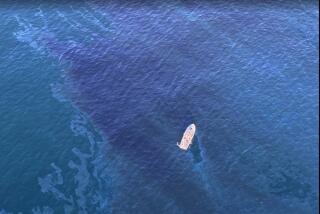Oil spill five times as large as earlier thought
- Share via
Reporting from Venice, La. — The amount of oil gushing into the Gulf of Mexico from an oil rig disaster is five times as large as had been believed, the Coast Guard said Wednesday night.
Another leak has been found near the site where the British Petroleum rig exploded and sank last week, Coast Guard Petty Officer Erik Swanson said. The total amount of oil leaking into the gulf is 5,000 barrels a day — not the 1,000 barrels that had been estimated earlier, he said.
“We discovered it and we are going to attack it as much as possible now that we know that it’s there,” he said.
But Doug Suttles, a BP chief operating officer, disputed the larger estimate, the Associated Press reported.
Rear Adm. Mary Landry told the Associated Press that President Obama has been briefed about the larger estimate and she said that the government has offered to have the Department of Defense help contain the spill from the Deepwater Horizon drilling rig.
Eleven workers are missing and presumed dead in the incident.
Officials predict the oil could reach the Louisiana coast by Friday, somewhere near the Mississippi Delta.
The nonprofit environmental group SkyTruth warned that the growing disaster “could soon surpass the sorry benchmark 20 years ago set by the 11 million gallon Exxon Valdez spill.”
Based on an analysis of radar satellite images of the spill, SkyTruth calculated that at least 6 million gallons had already entered the gulf — at a rate of about 20,000 barrels a day. (An oil barrel is 42 gallons.)
SkyTruth posted its estimates on its website, SkyTruth.org, before the Coast Guard announced its new leak estimates.
Crews continued to fight the spill, which was 600 miles in circumference and about 23 miles offshore. BP leased the rig and is responsible for the cleanup.
After days of sucking up the oil-water sheen with special ships and barges and spraying chemical dispersants from planes, crews set a controlled burn Wednesday to rid the sea of some of the oil.
Crews set ablaze a modest amount of oil that was ringed by a flame-retardant boom, said Daren Beaudo, a BP spokesman. If that succeeds, the oil company could set more fires to burn off more oil.
BP’s Suttles said crews were making every effort to keep the oil offshore. But anticipating the worst, they had put down more than 100,000 feet of protective boom intermittently along stretches near the shoreline, from the mouth of the Mississippi River east to Mobile Bay, Ala.
“It’s premature to say this is catastrophic,” Landry said earlier in the day. “I will say this is very serious.”
Robot submarines struggled in vain to shut off the wellhead, which is about a mile undersea, while BP engineers worked to construct an experimental collection system for the oil and finalize plans to drill a new well that could stop the leaking.
Those solutions may not be realized for weeks. And as the days have passed, people along the gulf, from Texas to Florida, have become increasingly concerned about the effect on both the environment and economy.
Exactly where the slick will make landfall depends on how big the leak will grow and on wind and tides.
The worry is most acute in south Louisiana, where the oil is closest. The seafood harvested in the gulf and in the brackish maze of waterways inland is more than a big industry — it is a defining element of the culture, and a crucial tourist draw.
At stake, local fishermen said, is the fate of Louisiana’s $1.6-billion seafood industry — and a way of life.
“I’ve got no backup,” shrimper Rob Canty said Wednesday morning as he applied a layer of primer to his dock-bound boat, the Isaac James, in the fishing town of Venice. “This is all I ever did — shrimp, crab, oysters. If shrimping was bad, we’d go crabbing. If crabbing was bad, we’d go oystering. Now we might not have anything to fall back on.”
Dave Cvitanovich, who operates a couple of oyster boats out of Empire, La., was worried about changes in the taste of his catch. So was his cousin Tommy Cvitanovich, owner of beloved Drago’s Seafood Restaurant in suburban Metairie.
“My livelihood is in oysters,” Tommy Cvitanovich said.
Ralph Portier, a professor at Louisiana State University who teaches aquatic marine toxicology, said earlier Wednesday that much was unknown, but it was unlikely that the slick would destroy the entire seafood industry.
According to BP officials, the oil is light, sweet crude, as opposed to the heavy crude that poured into the waters off Alaska during the Exxon Valdez spill. That in itself is good news, because light crude is more biodegradable.
But Portier warned that the oil, if it reached the shore, might still have serious consequences, tainting shrimp, oysters, fish and crabs in the short run, and disrupting breeding to create more long-term problems.
“What if the entire wetlands is compromised over the next five months?” he said. “It’s going to shut down lifestyles. It’s going to shut down fisheries. It’s going to shut down businesses.”
In Venice, Canty and other fishermen were worried about the fate of the inland shrimping season, which was set to open in about three weeks.
Canty was also worried that government officials might prohibit him from fishing if the oil got too close. That happened a couple of years ago, he said, after a big oil spill in the Mississippi, depriving him of income for weeks. When he gets a better idea of where the slick is moving, he said, he and his two-man crew may pick an untainted part of the gulf and move there.
“Any day now we might have to pull out,” the 31-year-old said. “I got a boat note; I got a house note. My deckhands have families. I can’t just sit around.”
Also worried are the charter captains who take big spenders out on the open water to fish for tuna, snapper, shark and barracuda. They already have been hit hard by the recession.
“If this knocks me out for the summer, I’m in trouble,” said Peace Marvel, 43, owner of Peacekeeper Charters.
Even though the oil industry was to blame for their trouble, it was difficult to find a fisherman resentful of the other big business in this part of Louisiana. Marvel noted that there was a symbiotic relationship between his business and big oil; the rigs and platforms create artificial reefs that make for some of the best fishing in the world.
“I mean, I fished around the Horizon two days before it exploded,” he said. “A lot of good yellowfin around there.”
Some callers to WWL, New Orleans’ popular talk radio station, were harsher Wednesday. One suggested a boycott of BP to spur it to take more action. Another, echoing post-Hurricane Katrina sentiment, wondered why the state and federal government weren’t doing more.
“For decades they didn’t give a crap about us,” host Bob DelGiorno said in agreement. “And they still don’t.”
More to Read
Sign up for Essential California
The most important California stories and recommendations in your inbox every morning.
You may occasionally receive promotional content from the Los Angeles Times.










